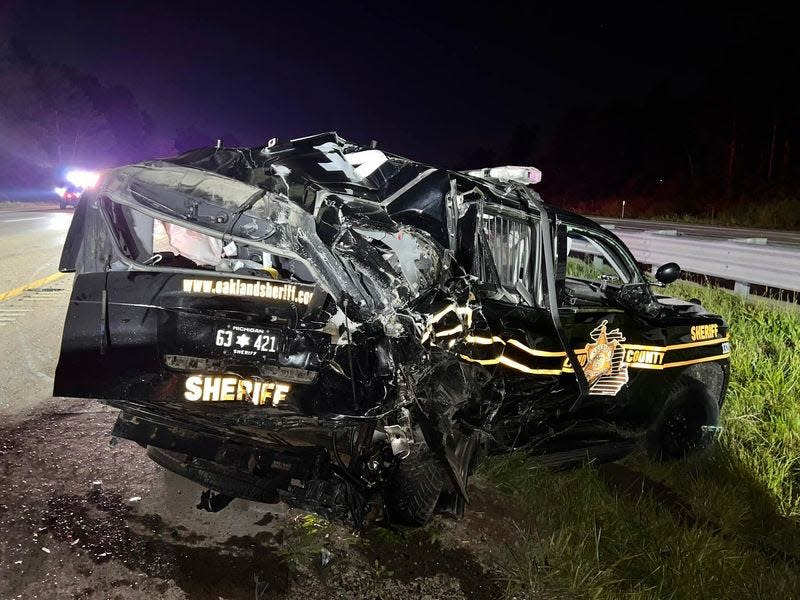5 mistakes you shouldn't make right after you're in a traffic crash

If you’re in a traffic crash, don’t do what two Oakland County deputies had to do – sit in their cars in a highway lane.
Even with emergency lights flashing, as these cops assisted a tow truck, a pickup truck on M-59 slammed into them one minute before midnight on Saturday, Aug. 19. Both deputies were injured, one seriously, but the pickup driver died after he was extricated by Rochester Hills emergency responders.
For anyone but police, sitting in a parked car on a highway is a no-no. If you’ve been in a crash, that’s asking for another crash. It’s tops on this list of five mistakes that you don’t want to make after a collision.
Don’t just sit there
Get your vehicle and yourself off the road as soon as possible. As of 2015, there’s a state law in Michigan and most other states. Police say, “If you can steer it, clear it.” You must get off the road if your car is drivable, and if no one has obvious injuries. Whoa, online advice from a law firm says: “Do not move your vehicle. It is very important that your vehicle stays in its original location for insurance purposes.” Wrong. What should you do? Drive to the shoulder or next exit, then stay in your car with seat belt buckled. Moving to a safe place, perhaps a parking lot or even a police station, does not equate to leaving the scene of an accident, according to Michigan law. Of course, right away flick on your four-way flashers.
As for the pickup hitting those deputies, at a speed estimated by crash investigators to be more than 70 m.p.h., it was “a tragic reminder to the public to stay capable of driving, stay focused, and move over a lane away from emergency vehicles” as required by state law, Oakland County Sheriff Michael Bouchard says.
Can't afford a lawyer? Here's how to file your own suit in Small Claims Court
Don’t delay calling 911
Be prepared to say exactly where you are and give your name. Also, say if you left the scene and why. For example, you felt threatened by speeding cars, darkness, an unfamiliar area or the behavior of the other driver. State law says you must call 911 in a crash that causes injury or more than $1,000 in damage. Rule of thumb?“If there’s visible damage, then call,” Bouchard says. Yet, even in minor crashes, it never hurts to summon police. Many drivers say talking to a 911 operator calmed them after a crash, guiding them on what to do.
Don’t flash your license
Protect your ID, including your home address. If no police are around, provide your name, phone number and insurance info to the other driver. But be aware: Some at-fault drivers give phony names. In a serious crash, wait for police to arrive before exchanging info. While waiting, no matter who might be at fault, just say you’re waiting for police − as you roll up your window. Once a cop arrives, share any information the officer wants. Try to get the other driver's name, insurance company, phone number and license plate. Get the officer’s name, too.
Don’t take the blame
Instead, take pictures – of both cars, if you can, including license plates. Do that quickly if the other driver starts leaving the scene. But don’t blame others for the crash. Just tell police what you think happened. Stick to the facts, at the scene and if you’re questioned later. If you take the blame and start apologizing, that can affect an insurance settlement. Even though Michigan is a “no-fault” state, some crashes end up in court. And if your crash happens elsewhere, remember that Michigan’s neighboring states – Ohio, Indiana and Wisconsin – don’t have “no-fault” insurance.
Michigan's gun laws change: Background checks, storage, temporary removal
Don’t skip medical care
Numerous crash victims are dazed and want to think they’ll be fine. If in any doubt, get examined. Injuries may become evident after several hours, or even days or weeks later. If you feel fine, your passenger may need attention.
One more tip? It applies, not if you crash but, if you happen to see a crash that just happened. Sorry, church-goers: Don’t be a Good Samaritan.
“We really don’t want people to stop and help,” says Lt. Mike Shaw, spokesman for the Michigan State Police. "We’re seeing more people stopping to help and becoming a hindrance” to emergency responders, as well as a danger to themselves, Shaw says. What helps most when a motorist sees a fresh crash?
“We’d rather you stopped somewhere else that’s safe and just call 911, and really try to know your location when you call,” Shaw says.
So, are you at risk? Traffic fatalities are up – in Michigan, up 15% from 2018 through 2022, according to State Police. Today’s vehicles are bigger and faster, and more drivers are reckless. That’s a trend from the pandemic, when roads were almost empty. “We call it the COVID hangover,” says Gary Bubar, traffic safety specialist with AAA Auto Club Group.
Now, more than ever, Bubar says it’s smart to drive defensively. Go with traffic but not ahead of it. And watch out for scofflaws who speed, run red lights or tailgate.
Contact: blaitner@freepress.com
This article originally appeared on Detroit Free Press: What to do if you're in a traffic crash: Avoid these mistakes
